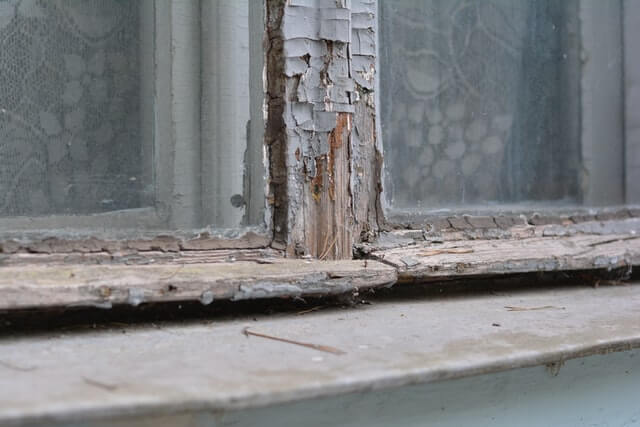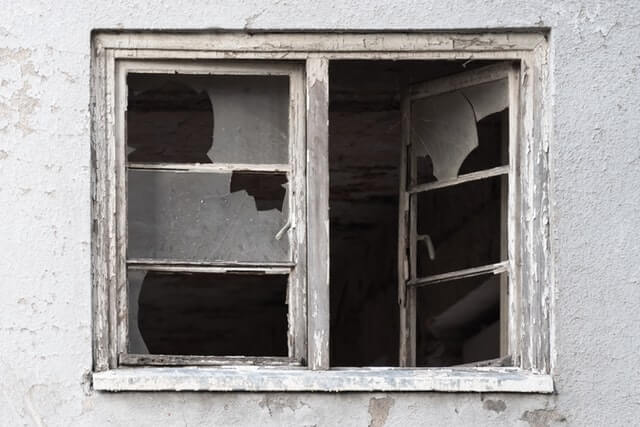Let’s Develop your Eye for Worn Windows
All windows have a life expectancy. Many homeowners are content allowing their windows to be wear well past that date. This can lead to higher energy bills, seasonal hot or cold spots near windows, and a general lack of comfort in your home. To answer, “When is it time to replace your old windows?” ask yourself these questions:
- Do I see cracks in the glass or window frames?
- Does condensation pile up on my windows?
- Do my windows leak when it rains?
- Have I had any difficulty opening or closing these windows?
- Are parts missing from my windows?
- Do I have high heating and cooling costs?
- Is my house going on the market?
If you answered “YES” to any of these questions, you should consider new windows.
What Do Old or Damaged Windows Look Like?



Look at this rotation of stock photos. Each of them shows very common and very late-stage signs of issues with the windows. They show condensation – or fogging – on the glass, broken panes of glass, and peeling paint with wood rot. If you see any of these signs, they indicate issues with the windows that require correction. They all also imply that further damage may have occurred that might need replacing underneath the windows. Call your window professional and have pictures ready to send them for immediate assessment.
“I’ve Looked and I Don’t Have Those Problems. What’s Next?”
If your window problems are not obvious on a quick glance then we have to do a more thorough investigation. You know your home better than anyone else does. Only you can properly answer these questions. Be honest. Do you ever feel a draft in a room? Has it ever felt like no matter how much you heat your house it stays cold? In the summer, does the sunlight cause you to draw your blinds or move from the most comfortable spot on the couch? Have you ever put up reflective foils to block sunlight?
A “YES” to any of these questions tells me that your current windows might not be a great fit for your house or your needs. We have the technology to tailor windows to how you want to enjoy your home. These problems also mean that you are losing a lot of energy.
What Are My Window Needs?
Every salesperson wants to answer this for you. If you ask, “When is it time to replace my old windows?” every salesperson will answer that there is no better time than the present. How can you make sure that they are being honest and respectful? Let us do an assessment without technical babble.
Here is a checklist of questions to answer so that you can personally evaluate your needs:
- Is your house frequently changing temperatures seasonally?
- Do you have lots of shade or trees nearby that blocks direct sunlight from your home?
- Do you want to change the aesthetics of your house?
- Are you planning any other renovations in the near future?
- Are you qualified for the government fund programs? Double-check by clicking here!
- Do you want to change how your windows open?
- Are you looking to soundproof certain windows?

Energy
Generally the more that the sun shines directly on your home the more energy efficient you want your windows to be. That often means that higher-efficiency glass options are required to reflect heat away from your windows. If you have high heating and cooling costs, you want to maximize your temperature retention.
Installation Methods
There are two most common installation methods in the residential business: the renovation installation and the new-construction installation. With the renovation installation, the labour costs are lower – because the installation is easier and faster – but doing other upgrades can be more difficult. In a renovation installation, the window has an additional flange that goes over your existing siding. In a new-construction method, the windows are finished with new wooden trims (or other materials!) If you plan any other renovations to the exterior, we recommend doing the new-construction finish.
Sound-Proofing
If you live near a busy street, next to a skytrain rail, or anywhere that noise is a concern then windows can be upgraded to have sound-resistant glass. Upgrading the glass to sound-resistant laminated glass will reduce the sound more than any other upgrade, but it can be combined with others too. For the most sound dampening that is realistically affordable you can buy triple-glazed windows that qualify for rebates that have this upgraded glass. Hinged windows also reduce sound more than sliders.
How the Windows Move
In terms of functions that are available for windows there are two primary opening mechanisms: hinges and sliders. Hinges have many different configurations while sliders are mostly straight-forward (and less expensive!). I hope to illustrate the different options clearly in this blog soon, but for now I would recommend going into the showroom and playing with the windows. See how they move and operate and consider the different options from the manufacturer.
Convinced? Still Not Sure?

We can help you figure out what windows are the best fit for your goals. Give our team a call or click the button below to reach out.

